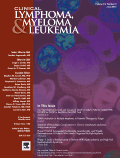
Clinical Lymphoma Myeloma & Leukemia
Scope & Guideline
Exploring Innovations in Blood Cancer Treatment
Introduction
Aims and Scopes
- Clinical Trials and Treatment Protocols:
The journal publishes studies related to clinical trials, particularly those evaluating the efficacy and safety of new therapies for hematological malignancies, including various combinations of chemotherapy, immunotherapy, and targeted therapies. - Patient Outcomes and Quality of Life:
Research focusing on the clinical outcomes of patients undergoing treatment for blood cancers, including survival rates, quality of life assessments, and the impact of treatment on patient well-being, is a core area of interest. - Molecular and Genetic Research:
The journal highlights studies that explore the molecular and genetic underpinnings of hematological malignancies, including the identification of biomarkers for diagnosis, prognosis, and treatment response. - Epidemiology and Health Disparities:
It addresses the epidemiological aspects of hematological malignancies, including studies on incidence, prevalence, and disparities in treatment access and outcomes among different populations. - Innovative Therapies and Novel Approaches:
Focus on emerging therapies, including CAR-T cell therapies, bispecific antibodies, and other novel agents, as well as their mechanisms of action and potential to improve patient outcomes.
Trending and Emerging
- CAR-T Cell Therapies and Bispecific Antibodies:
There is a growing body of research on CAR-T cell therapies and bispecific antibodies, particularly in their application for treating relapsed and refractory multiple myeloma and other hematological malignancies. - Minimal Residual Disease (MRD) Monitoring:
The focus on MRD as a prognostic marker is increasing, with studies exploring its implications for treatment decisions and patient management, particularly in multiple myeloma and acute lymphoblastic leukemia. - Health Disparities and Access to Care:
Emerging research emphasizes the importance of understanding health disparities in hematological malignancies, particularly regarding treatment access and outcomes among diverse populations. - Patient-Reported Outcomes and Quality of Life:
There is a heightened interest in assessing patient-reported outcomes and quality of life, reflecting a shift towards patient-centered care in the management of hematological malignancies. - Integration of Genomic and Proteomic Data:
The integration of genomic and proteomic analyses to inform treatment choices and understand disease mechanisms is gaining traction, leading to more personalized treatment approaches.
Declining or Waning
- Traditional Chemotherapy Regimens:
There is a noticeable decrease in studies centered around traditional chemotherapy regimens as newer targeted therapies and immunotherapies gain prominence in treatment protocols. - Longitudinal Studies of Established Treatments:
Long-term studies evaluating the efficacy of established treatments such as older chemotherapy agents have become less frequent as the focus shifts towards innovative therapies and combination regimens. - Basic Science Studies Without Clinical Relevance:
Research that does not directly translate into clinical applications or lacks immediate relevance to patient care appears to be waning, as there is a stronger emphasis on studies that can lead to actionable insights in clinical practice. - Palliative Care Studies:
The volume of research specifically addressing palliative care approaches for hematological malignancies seems to have decreased, possibly overshadowed by the focus on curative and novel treatment strategies. - Single-Agent Studies:
The exploration of single-agent therapies is less common as the field increasingly favors combination therapies that leverage synergistic effects to enhance treatment efficacy.
Similar Journals
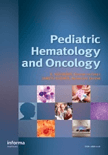
PEDIATRIC HEMATOLOGY AND ONCOLOGY
Transforming pediatric care with expert insights and research.Pediatric Hematology and Oncology, published by Taylor & Francis Inc, serves as a vital platform dedicated to the fields of hematology, oncology, and pediatrics, providing a comprehensive avenue for the dissemination of scholarly research and clinical advancements. With an ISSN of 0888-0018 and an E-ISSN of 1521-0669, this journal has successfully converged its expertise over the years from 1984 to 2024. Ranked in the Q3 category for Hematology and Oncology, alongside a Q2 ranking in Pediatrics, Perinatology, and Child Health (2023), it engages a diverse readership comprising researchers, healthcare professionals, and students eager to explore groundbreaking studies in child health and treatment methodologies. While it currently does not offer Open Access options, the journal is widely cited and recognized, particularly in its specialized fields, fostering a rich environment for dialogue and innovation in the management of pediatric hematological and oncological disorders. The journal is based in the United Kingdom at 530 Walnut Street, Ste 850, Philadelphia, PA 19106, making it an essential resource for those pursuing excellence in pediatric medical research.

Journal of Hematology
Innovating Insights into Blood DisordersThe Journal of Hematology, published by ELMER PRESS INC, serves as a pivotal platform for disseminating cutting-edge research in the field of hematology. With an ISSN of 1927-1212 and an E-ISSN of 1927-1220, this journal is committed to advancing scientific knowledge and clinical practice through high-quality peer-reviewed articles encompassing all aspects of blood disorders, from basic science to health policy implications. While the journal currently operates under a traditional access model, it nonetheless prioritizes the rapid publication of significant findings, ensuring that researchers, clinicians, and students have timely access to the latest advancements in hematological research. Positioned to bridge gaps in knowledge and foster collaboration among scholars worldwide, the Journal of Hematology is an essential resource for anyone invested in this vital area of medicine.
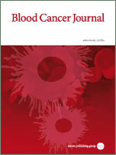
Blood Cancer Journal
Elevating standards in blood cancer studies.Blood Cancer Journal, published by SPRINGERNATURE, is a leading open-access journal that has been at the forefront of hematology and oncology research since its inception in 2011. With an impressive impact factor and a commitment to disseminating high-quality research, it holds a prestigious Q1 ranking in both hematology and oncology categories as of 2023. The journal is dedicated to publishing innovative studies, comprehensive reviews, and insightful commentaries that advance our understanding of blood cancers, making it an essential resource for researchers, healthcare professionals, and students in the field. Its open-access model ensures that groundbreaking research is accessible to a global audience, promoting collaborative efforts to enhance treatment methodologies and patient outcomes. With a strong reputation illustrated by its Scopus rankings—8th in hematology and 30th in oncology—Blood Cancer Journal exemplifies excellence and leadership in the ever-evolving landscape of cancer research.
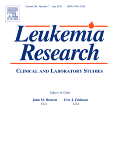
LEUKEMIA RESEARCH
Pioneering research for innovative leukemia treatments.Leukemia Research is a prominent academic journal dedicated to advancing the field of hematology and oncology, focusing on the latest research developments related to leukemia and other hematological disorders. Founded in 1977 and published by Pergamon-Elsevier Science Ltd in the United Kingdom, this esteemed journal has established itself as a vital resource for researchers and clinicians alike. With an impressive impact factor and categorized in the top quartiles of Cancer Research and Hematology, it provides a platform for high-quality research articles, reviews, and clinical studies that contribute to a deeper understanding of leukemia's complexities. Although not an Open Access journal, Leukemia Research ensures widespread dissemination of knowledge crucial for developing innovative treatment strategies and improving patient outcomes. Researchers, professionals, and students in the fields of hematology and oncology will find this journal an invaluable asset in staying at the forefront of leukemia research, as it prepares to expand its impact through converged years of publication extending into 2024.

World Journal of Oncology
Connecting insights to combat cancer effectively.The World Journal of Oncology, published by ELMER PRESS INC, is a vibrant platform for disseminating groundbreaking research and advancements in the field of oncology. With its ISSN 1920-4531 and E-ISSN 1920-454X, this journal is dedicated to publishing high-quality studies that enhance our understanding of cancer and its treatment. The journal is recognized for its significant contributions, evidenced by its Q2 classification in both Cancer Research and Oncology categories in 2023, and accolades such as a Scopus rank of #126/404 in Medicine _ Oncology. Catering to the needs of researchers, professionals, and students, the World Journal of Oncology offers an essential resource for the latest scientific insights and clinical practices, ensuring the global oncology community remains informed and engaged. The journal operates under a selective publication model, maintaining rigor in peer review while facilitating knowledge sharing across converged years from 2014 to 2016 and 2020 to 2024, further establishing its importance in the ongoing fight against cancer.

International Journal of Clinical Oncology
Pioneering Discoveries in Clinical OncologyInternational Journal of Clinical Oncology, published by SPRINGER JAPAN KK, is a leading peer-reviewed journal dedicated to advancing research and clinical practices in the fields of oncology, hematology, and surgery. With its impact factor reflecting its significance and reach in the academic community, this journal serves as a solid platform for researchers, professionals, and students to share and disseminate groundbreaking discoveries and methodologies. Notably, it has secured prestigious rankings in the Q1 category in Medicine (miscellaneous) and Surgery, and Q2 in Hematology and Oncology, illustrating its prominent position in the medical literature. The journal's comprehensive scope addresses pivotal clinical issues from 1996 through 2024, further solidifying its relevance in the ever-evolving landscape of cancer research. Despite not offering open access, the depth and quality of research articles ensure that vital information remains accessible to those committed to improving clinical outcomes in oncology. With a focus on innovative treatments and patient care, the International Journal of Clinical Oncology embodies a commitment to fostering excellence in medical research.
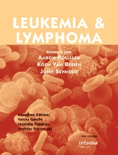
LEUKEMIA & LYMPHOMA
Leading the charge in leukemia and lymphoma insights.LEUKEMIA & LYMPHOMA is a prestigious peer-reviewed journal published by Taylor & Francis Ltd, focusing on vital research in the fields of hematology, oncology, and cancer research. With an ISSN of 1042-8194 and an E-ISSN of 1029-2403, this journal is recognized for its high-quality and impactful contributions to understanding blood cancers, with a notable impact factor reflective of its influence. Since its inception in 1989, LEUKEMIA & LYMPHOMA has continuously provided a platform for researchers and professionals to disseminate their findings, fostering advancements in diagnostic, therapeutic, and clinical strategies related to leukemias and lymphomas. The journal ranks in the Q2 category for both Hematology and Oncology research categories as of 2023, underscoring its commitment to excellence. The journal is based in the United Kingdom and serves a global audience, making it an essential resource for those dedicated to improving outcomes for patients with hematological malignancies.
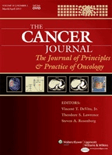
CANCER JOURNAL
Innovating Oncology: Where Research Meets Impact.CANCER JOURNAL is a leading peer-reviewed publication dedicated to the dissemination of innovative research in the fields of cancer research and oncology. Published by Lippincott Williams & Wilkins, this journal serves as an essential resource for researchers, clinicians, and students seeking to advance their understanding of cancer mechanisms, treatment strategies, and patient care. With an ISSN of 1528-9117 and an E-ISSN of 1540-336X, it boasts a respectable 2023 Q2 category ranking in both Cancer Research and Oncology, reflecting its impactful contributions to the scientific community. Although it currently does not offer open access, the journal's rigorous peer-review process ensures the publication of high-quality, relevant studies that stimulate further investigation and collaboration among professionals. Since its inception, the journal has evolved through several converged years, maintaining a steadfast commitment to addressing the complexities of cancer biology and treatment. At its core, CANCER JOURNAL aims to foster advancements in oncology, making it a vital platform for sharing pivotal findings that could transform cancer research and therapeutic practices.
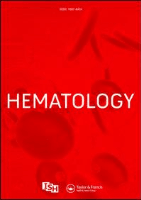
Hematology
Transforming Hematology: Open Access to Tomorrow's DiscoveriesHematology is a distinguished open-access journal published by Taylor & Francis Ltd, dedicated to advancing research and knowledge in the field of hematology. Established in 1996, the journal has continually evolved to meet the needs of a growing community of researchers and practitioners, providing a vital platform for disseminating innovative findings and clinical insights. With its impact factor reflecting a robust commitment to quality scholarship, Hematology has achieved a respectable position in its category as evidenced by its Q3 ranking in the Hematology category and ranks #85 out of 137 in the Scopus index, which positions it in the 38th percentile among its peers. The journal’s open-access policy, initiated in 2019, further enhances its reach and accessibility, allowing a broad audience of professionals, researchers, and students to engage with high-quality research without barriers. By covering a wide range of topics related to blood disorders, treatment methodologies, and emerging therapies, Hematology stands as an essential resource for those dedicated to innovation in this critical area of healthcare.
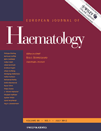
EUROPEAN JOURNAL OF HAEMATOLOGY
Advancing Hematology Research for a Healthier TomorrowEUROPEAN JOURNAL OF HAEMATOLOGY, published by Wiley, serves as a vital resource for experts in the field of hematology, focusing on the latest advancements in blood disorders and therapies. With an ISSN of 0902-4441 and an E-ISSN of 1600-0609, this esteemed journal has been disseminating knowledge since 1986 and continues to thrive, converging its visionary approach through to 2024. Notably, it holds a distinguished Q2 ranking in Hematology and an impressive Q1 ranking in the broader category of Medicine (miscellaneous) as of 2023, highlighting its significant contribution to the scientific community. With a Scopus rank of #45/137 and a 67th percentile in the field, the journal is recognized for its rigorous peer-reviewed research, making it an indispensable publication for researchers, practitioners, and students aiming to stay at the forefront of hematological studies. Though not an open-access journal, it ensures broad accessibility to critical findings via its subscription model, thus fostering an informed and globally engaged audience.